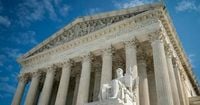The fate of more than 300,000 Venezuelan migrants in the United States has once again landed before the Supreme Court, as the Trump administration intensifies its efforts to end Temporary Protected Status (TPS) for this group. On September 19, 2025, the Department of Justice filed an emergency application with the high court, seeking to overturn a federal judge’s ruling that Homeland Security Secretary Kristi Noem lacked the authority to terminate TPS for Venezuelans. This move marks the second time the administration has asked the Supreme Court to intervene in this contentious legal battle, reflecting the ongoing tug-of-war between the executive branch and the judiciary over immigration policy.
TPS, a humanitarian program enacted by Congress in 1990, allows nationals from countries experiencing war, natural disaster, or other extraordinary conditions to live and work legally in the U.S. without fear of deportation. According to Reuters, the Biden administration had extended TPS for Venezuelans through October 2026, covering about 600,000 people. The status grants not only relief from deportation but also the ability to obtain employment and travel authorization. For many, it represents a lifeline amid Venezuela’s ongoing political repression and economic crisis.
The latest legal showdown stems from a series of rapid-fire court rulings. Earlier this month, U.S. District Judge Edward Chen in San Francisco ruled that Secretary Noem’s attempt to end TPS for both Venezuelans and Haitians was unlawful, citing violations of federal law governing agency conduct. The 9th Circuit Court of Appeals declined to stay Chen’s decision, leaving the protections in place for now. However, the Trump administration’s emergency request to the Supreme Court specifically targets Venezuelan TPS recipients, not Haitians. As CBS News reported, Solicitor General D. John Sauer argued that the government should be allowed to revoke the protections while the case is litigated in the appellate courts and, potentially, before the Supreme Court itself.
This legal back-and-forth is hardly new. In May 2025, the Supreme Court had already sided with the Trump White House, lifting a preliminary order from Judge Chen that had temporarily blocked the termination of TPS for Venezuelans. That ruling, as is typical for emergency appeals, came without explanation. Judge Chen, undeterred, issued his final ruling on September 5, 2025, again finding that Secretary Noem’s actions violated federal procedures. The Justice Department’s latest filing to the Supreme Court was blunt: “So long as the district court’s order is in effect, the Secretary must permit over 300,000 Venezuelan nationals to remain in the country, notwithstanding her reasoned determination that doing so even temporarily is ‘contrary to the national interest’.”
The administration’s argument hinges on the notion that TPS was never meant to be a permanent fixture. According to Newsweek, the Trump administration has consistently maintained that TPS protections are intended to be temporary, not a pathway to indefinite residency. “Since the statute was enacted, every administration has designated countries for TPS or extended those designations in extraordinary circumstances. But Secretaries across administrations have also terminated designations when the conditions were no longer met,” the administration wrote in its submission to the Supreme Court.
But immigration advocates and many Venezuelan migrants see things differently. Adelys Ferro, co-founder and executive director of the Venezuelan American Caucus, told Newsweek on August 29: “We, more than 8 million Venezuelans, just didn’t leave the country just because it’s fun, it’s because we had no choice...Venezuelans with TPS are not a threat to the United States.” For these individuals, the idea of returning to Venezuela is fraught with danger and uncertainty, especially given the country’s ongoing instability and the impact of international sanctions.
The legal case itself has become a flashpoint in the broader debate over the scope and limits of executive authority—and the proper role of the courts. Solicitor General Sauer, in his emergency application, criticized what he described as “the increasingly familiar and untenable phenomenon of lower courts disregarding this court’s orders on the emergency docket.” He cited a recent concurring opinion by Justice Neil M. Gorsuch, who chastised federal trial judges for what he saw as defiance of Supreme Court directives. Judge Chen, for his part, argued that the Supreme Court’s earlier order in May “did not provide any specific analysis,” and so he was not bound by it when issuing his final ruling in September.
This procedural wrangling has left Venezuelan TPS holders in a state of limbo. As The New York Times explained, the Supreme Court’s so-called “shadow docket”—used for emergency requests—often produces terse, provisional orders with little or no explanation, making it difficult for lower courts to discern the precedential value of such decisions. This ambiguity has fueled frustration and confusion among both judges and litigants, complicating an already complex legal landscape.
The Trump administration’s push to end TPS for Venezuelans is part of a broader crackdown on both legal and illegal immigration. On the same day it filed its Supreme Court request regarding Venezuelans, the Department of Homeland Security also announced the termination of TPS protections for thousands of Syrians, with those protections set to lapse on September 30, 2025. The administration has encouraged Venezuelans to self-deport, underscoring its belief that conditions in their home country have improved sufficiently to warrant their return. Secretary Noem’s position, however, does not entirely align with the broader administration’s stance on Venezuela, particularly regarding the regime of President Nicolas Maduro.
The main plaintiff in the ongoing TPS litigation is the National TPS Alliance, a group led by TPS beneficiaries themselves. Their lawsuit argues that the administration’s move to end TPS for Venezuelans was not only procedurally flawed but also influenced by racial bias—a claim that has yet to be fully tested in court. Meanwhile, the lives of hundreds of thousands of Venezuelans hang in the balance, their futures dependent on the outcome of a legal and political battle that shows no signs of abating.
For now, all eyes are on the Supreme Court. Will the justices side with the administration and allow TPS protections to be lifted while the case winds its way through the courts? Or will they uphold Judge Chen’s ruling, preserving a fragile sense of security for Venezuelan migrants? The answer could have profound implications—not just for those directly affected, but for the future of U.S. immigration policy itself.
As the legal drama unfolds, the stakes remain high for Venezuelan families across the country, caught between shifting policies and the unpredictable tides of American law. For many, the question is not just about legal status, but about the possibility of building a stable life in a country they now call home.


